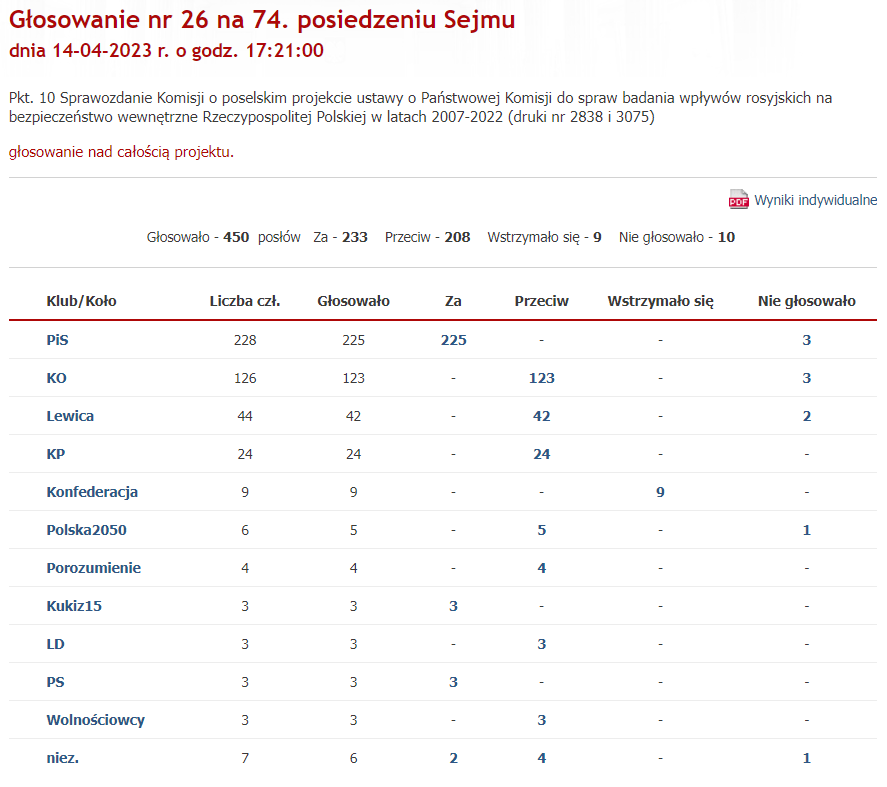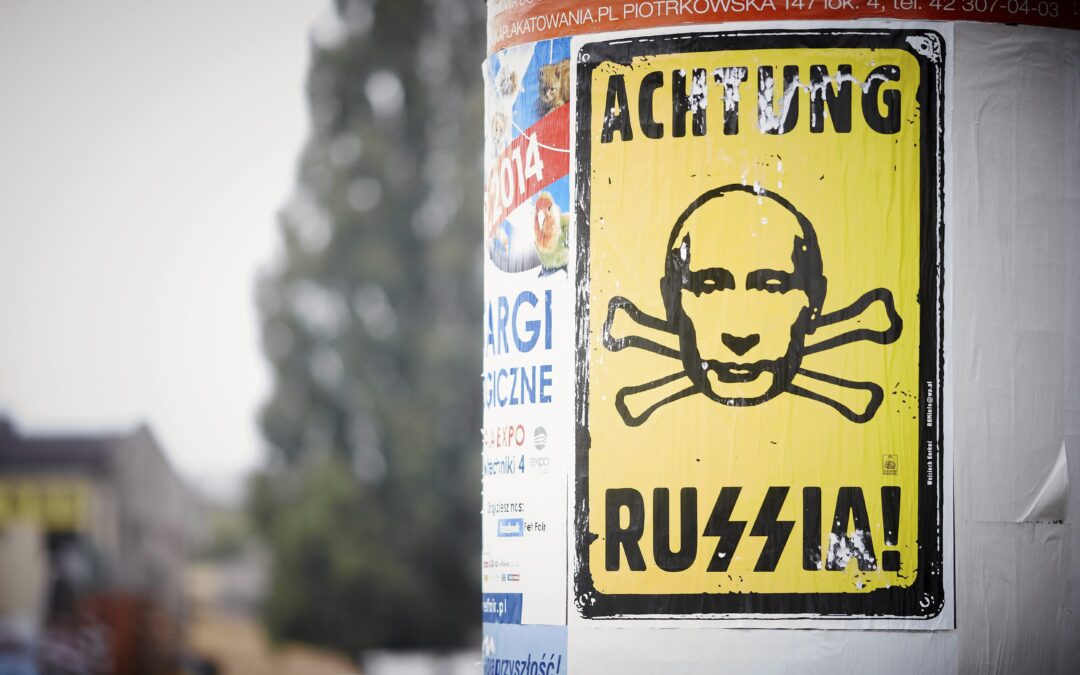Poland’s ruling party has pushed through plans to create a commission to investigate past Russian influence in the country. The idea has been condemned by the opposition, who argue that the body – which would be able to ban people from office – will be used for political purposes ahead of this autumn’s elections.
In a vote yesterday in the lower-house Sejm, the bill to create the commission was passed with 233 votes in favour, all of which came from the caucus of the ruling national-conservative Law and Justice (PiS) party and some smaller groups that regularly support it.
There were 208 votes against, all of which came from the centrist and left-wing opposition. The far right abstained.
The bill now passes to the opposition-controlled Senate, which only has the power to delay the legislation, not to block it. Once approved by parliament, it goes to the desk of President Andrzej Duda, normally a PiS ally, who can sign or veto it.

How MPs from parliamentary caucuses voted (za = for, przeciw = against)
Once established, the commission would be tasked with investigating “public officials or members of senior management who, in the years 2007-2022, acted under Russian influence to the detriment of the interests of Poland”.
It would have the power to not only repeal decisions it found to have resulted from Russian influence, but also to ban individuals from carrying out functions relating to spending public funds for up to 10 years and prevent them from receiving security clearance for the same period.
In 2007, a government led by the centrist Civic Platform (PO), which is now the main opposition party, came to power. It ruled in partnership with the Polish People’s Party (PSL), a smaller agrarian party now also in opposition, until 2015, when a PiS-led coalition came to power.
Poland’s ruling party wants to establish a commission to investigate Russian influence on energy policies under the former government.
It would be empowered to issue 10-year bans on officials from taking up positions that involve spending public funds https://t.co/smU3BDRFAZ
— Notes from Poland 🇵🇱 (@notesfrompoland) November 28, 2022
Both PO and PiS have regularly accused one another of acting in the interests of Russia. PiS, for example, points to PO’s relatively friendly relations with Moscow when in power and its continued reliance on Russia for most of Poland’s energy imports.
It has also promoted a conspiracy theory that PO colluded with Russia to either cause or cover up the 2010 Smolensk plane crash that killed President Lech Kaczyński, the identical twin brother of PiS chairman Jarosław Kaczyński.
PO, for its part, notes how, prior to the invasion of Ukraine, PiS had cultivated an alliance with pro-Kremlin right-wing and far-right figures in Europe such as Marine Le Pen and Matteo Salvini. It also points out that coal imports from Russia increased during PiS’s early years in power.
The Sejm has passed a resolution recognising Russia "as a state that supports terrorism and uses terrorist measures"
But the vote was boycotted by the opposition due to the ruling party's decision to include a section blaming Moscow for the Smolensk crash https://t.co/YS73ee1Gxr
— Notes from Poland 🇵🇱 (@notesfrompoland) December 15, 2022
The opposition argues that the aim of the planned new commission is not to genuinely investigate Russian influence, but rather to mount politically motivated attacks.
The commission will operate within the prime minister’s chancellery and its nine members will be chosen by the Sejm, where PiS commands a majority.
A PiS MP, Kazimierz Smoliński, told the Polish Press Agency (PAP) yesterday that “we want four members to be nominated by the opposition and five by the ruling majority”. He says the aim is for the commission to begin work in June or July.
Poles dislike Russians, Belarusians, Hungarians and Germans much more now than before the invasion of Ukraine, finds a study by @CBOS_Info.
Meanwhile, they like Ukrainians, Americans and the English much more.
For more details, see our report: https://t.co/pbavexH2mm pic.twitter.com/rucZ1WR1xG
— Notes from Poland 🇵🇱 (@notesfrompoland) March 27, 2023
The opposition say that the commission would therefore be used to attack them before parliamentary elections that will take place in the autumn and to prevent opposition figures from taking office if they win the election. They also argue that the wideranging powers given to the commission are unconstitutional.
One opposition MP, Jakub Stefaniak, told broadcaster TVN that the creation of the commission is “an attempt to erase political opponents, just like Stalin did”.
A deputy minister and MP from the ruling camp, Janusz Kowalski, made clear yesterday that he “hopes the result of the work of this commission will be bringing [former prime minister and PO leader] Donald Tusk before the State Tribunal” – the body charged with convicting public officials.
"Jak przekonywał w rozmowie z dziennikarzami poseł Solidarnej Polski Janusz Kowalski, "efektem pracy tej komisji będzie postawienie Donalda Tuska przed Trybunałem Stanu".
Tyle, jesli chodzi o cel komisji https://t.co/nEMZOw0OJ5
— Michał Protaziuk (@michalprotaziuk) April 14, 2023
Main image credit: Marcin Stepien / Agencja Wyborcza.pl

Daniel Tilles is editor-in-chief of Notes from Poland. He has written on Polish affairs for a wide range of publications, including Foreign Policy, POLITICO Europe, EUobserver and Dziennik Gazeta Prawna.




















